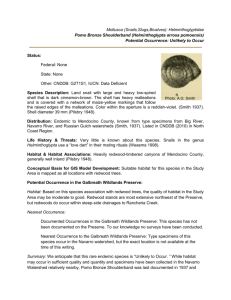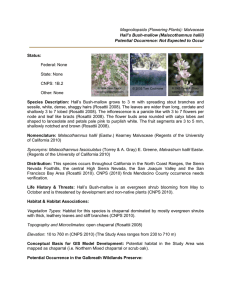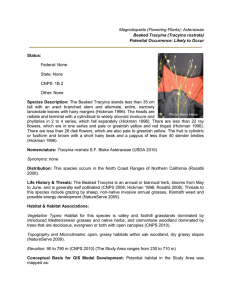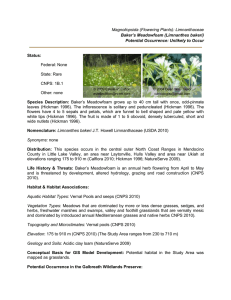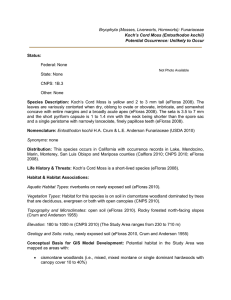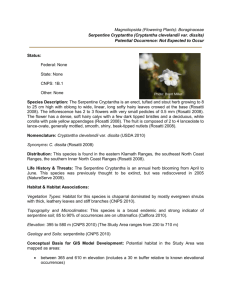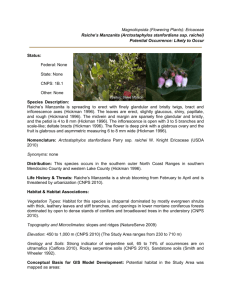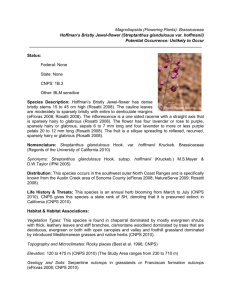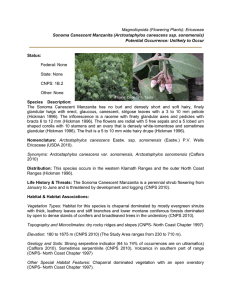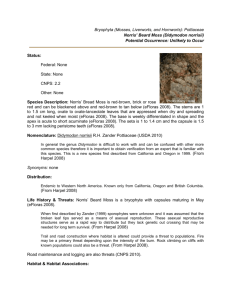MAME Text,
advertisement
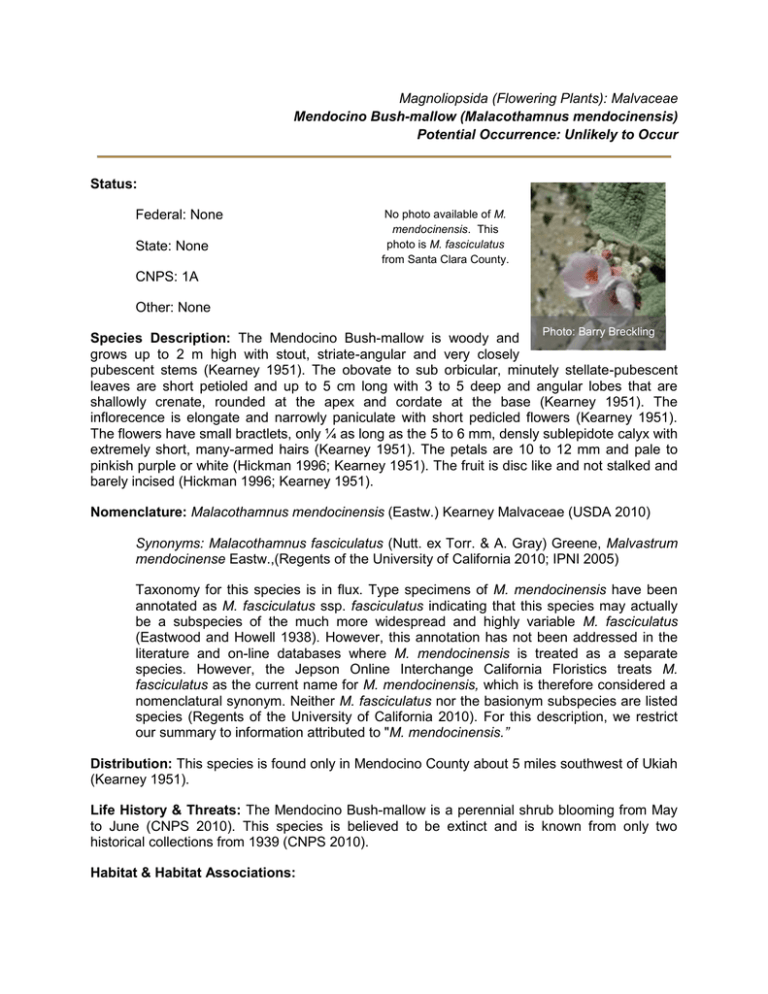
Magnoliopsida (Flowering Plants): Malvaceae Mendocino Bush-mallow (Malacothamnus mendocinensis) Potential Occurrence: Unlikely to Occur Status: Federal: None State: None No photo available of M. mendocinensis. This photo is M. fasciculatus from Santa Clara County. CNPS: 1A Other: None Photo: Barry Breckling Species Description: The Mendocino Bush-mallow is woody and grows up to 2 m high with stout, striate-angular and very closely pubescent stems (Kearney 1951). The obovate to sub orbicular, minutely stellate-pubescent leaves are short petioled and up to 5 cm long with 3 to 5 deep and angular lobes that are shallowly crenate, rounded at the apex and cordate at the base (Kearney 1951). The inflorecence is elongate and narrowly paniculate with short pedicled flowers (Kearney 1951). The flowers have small bractlets, only ¼ as long as the 5 to 6 mm, densly sublepidote calyx with extremely short, many-armed hairs (Kearney 1951). The petals are 10 to 12 mm and pale to pinkish purple or white (Hickman 1996; Kearney 1951). The fruit is disc like and not stalked and barely incised (Hickman 1996; Kearney 1951). Nomenclature: Malacothamnus mendocinensis (Eastw.) Kearney Malvaceae (USDA 2010) Synonyms: Malacothamnus fasciculatus (Nutt. ex Torr. & A. Gray) Greene, Malvastrum mendocinense Eastw.,(Regents of the University of California 2010; IPNI 2005) Taxonomy for this species is in flux. Type specimens of M. mendocinensis have been annotated as M. fasciculatus ssp. fasciculatus indicating that this species may actually be a subspecies of the much more widespread and highly variable M. fasciculatus (Eastwood and Howell 1938). However, this annotation has not been addressed in the literature and on-line databases where M. mendocinensis is treated as a separate species. However, the Jepson Online Interchange California Floristics treats M. fasciculatus as the current name for M. mendocinensis, which is therefore considered a nomenclatural synonym. Neither M. fasciculatus nor the basionym subspecies are listed species (Regents of the University of California 2010). For this description, we restrict our summary to information attributed to "M. mendocinensis.” Distribution: This species is found only in Mendocino County about 5 miles southwest of Ukiah (Kearney 1951). Life History & Threats: The Mendocino Bush-mallow is a perennial shrub blooming from May to June (CNPS 2010). This species is believed to be extinct and is known from only two historical collections from 1939 (CNPS 2010). Habitat & Habitat Associations: Vegetation Types: Habitat for this species is cismontane woodland dominated by trees that are deciduous, evergreen or both with open canopies (CNPS 2010). Topography and Microclimates: Steep rocky cliff (Smith and Wheeler 1992). On bank along roadside (Eastwood 1939). Elevation: 425 to 575 m (CNPS 2010). (The Study Area ranges from 230 to 710 m) Conceptual Basis for GIS Model Development: Potential habitat in the Study Area was mapped as areas: above 395 m and below 605 m elevation (a 30 m elevation buffer was added around known elevational occurrences of this species) cismontane woodland (i.e., mixed, mixed montane or single dominant hardwoods with canopy cover 10 to 40%) We mapped best potential habitat as areas in the above areas with: Steep slopes (>18 degrees) Roadsides Potential Occurrence in the Galbreath Wildlands Preserve: Habitat: Mendocino Bush Mallow occurs on steep rocky cliffs in cismontane woodland. Habitat quality is moderate to good. Cismontane woodland within the appropriate elevational range is highly restricted, but does occur on the steep slopes preferred by this species. Field reconnaissance also indicates that rocky outcrops are abundant within all habitat types of the Preserve and suggest that rocky soils may occur within these areas. The largest patch of potential habitat is located in the southern center of the Preserve and also includes an area of roadside. Nearest Occurrence: Documented Occurrences in the Galbreath Wildlands Preserve: Previous species list for the Galbreath Wildlands Preserve did not document this species (SSU Field Station and Nature Preserves 2010). Nearest Occurrence to the Galbreath Wildlands Preserve: This species is documented from only 6 occurrences, all with Mendocino County, and is believed to be extinct (Calflora 2010). The nearest occurrence was approximately 13 miles north of the Study Area in the Navarro River watershed (Calflora 2010). Occurrence of this species at the Galbreath Wildlands Preserve would constitute a southern extension. Summary: The Mendocino Bush-mallow is “Unlikely to Occur” in the Preserve because habitat quantity is limited, occurrence at the Preserve would constitute a 13 mile southern range extension, and the last recorded occurrence of this species was in 1939. References Breckling B. 2009. Malacothamnus fasciculatus. Chaparral Mallow. < http://calphotos.berkeley.edu/cgi-bin/img_query?rel-taxon=contains&wheretaxon=Malacothamnus+fasciculatus|Malacothamnus+hallii>. Accessed 2011 Apr 3. Calflora. 2010. Information on California plants for education, research and conservation.<http://www.calflora.org/> Accessed 2010 Jul 17. California Native Plant Society (CNPS). 2010. Inventory of Rare and Endangered Plants. Online edition, v7-10b. <http://www.cnps.org/inventory> Accessed 2010 Jul 17. Hickman JC editor. 1996. The Jepson Manual Higher Plants of California. 3rd printing. London: University of California Press, Ltd. 751 p. International Plant Name Index (IPNI). 2005. <http://www.ipni.org/>. Accessed 2010 Jun 27. Kearney TH. 1951. The Genus Malacothamus, Greene (Malvaceae). Leaflets of Western Botany 6: 133-4. Eastwood A. 1939. New Californian Plants. Leaflets of Western Botany 2: 188. Eastwood A, Howell JT. 1938. Consortium of California Herbaria. <http://ucjeps.berkeley.edu/cgibin/get_consort.pl?taxon_name=Malacothamnus%20fasciculatus>. Accessed 2010 Jul 17. Regents of the University of California. 2010. The Jepson Online Interchange California Floristics. <http://ucjeps.berkeley.edu/interchange/> Accessed 2010 Jul 17. Smith GL, Wheeler CR. 1992. A flora of the Vascular Plants of Mendocino County, California. San Francisco: University of San Francisco. 204 p. SSU Field Stations and Nature Preserves. 2010. Galbreath Wildlands Preserve Vascular Plant List. <http://www.sonoma.edu/preserves/docs/galbreath_vascular_plants.pdf>. Accessed 2010 Jun. United States Department of Agriculture (USDA). 2010. PLANTS Profile. <http://plants.usda.gov/java/profile?symbol=MAFA>. Accessed 2010 Jul 17. Species Account Description: Linden Schneider
